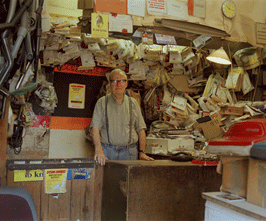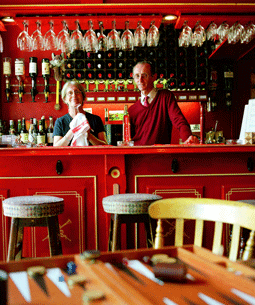The faces of Church Street
Photographer Richard Nolan-Neylan is currently presenting his first independent British exhibition, ‘The Face of Church Street’, featuring portraits of small business owners in Church Street, Stoke Newington.
Richard’s images are on display at The Blue Legume, 101 Church Street, until 6th January ( Monday – Saturday 9am – 11pm Sunday 9am – 6pm), as part of Photomonth 08, the East London Photography Festival.
Photomonth is the largest photography festival in the UK with over 100 exhibitions and events taking place in more than 60 galleries and spaces and featuring up to 500 photographers. All images in the exhibition were taken on Fujicolor PRO Series film and were printed on Fujicolor Crystal Archive paper. For more information visit www.richardnolan-neylan.co.uk
In 1956, at the age of nine, Asaf Rifac moved from Cyprus to the UK with his grandparents: “My dad wouldn’t leave Cyprus… It was the ‘50s, there was fighting and all that. He lived on the Greek side and my grandparents lived on the Cypriot side.”
Asaf moved briefly to Stamford Hill and now resides in Ware, Hertfordshire. “When I first came here, Stamford Hill was still a Jewish community. Round here was mainly West Indians in those days , a few Turks and Greeks. Slowly, it’s started changing. Houses that were £1,500 round the corner here started climbing. Now you’re talking £800,000!”
“Through the years, it’s changed,” he states. “Some people, they’ve gone home to the West Indies, and when they come back, they come in to see me… cos they’ve been coming in for years they just want to see something that’s still there.
“I get people who used to come in with their parents, now they’re coming in with their own kids. They say: ‘Do you remember me?’ – this six foot six guy, you know. I’d be like, ‘Yeah, I remember you!’”
Asaf found he fitted well into British society, adopting the mod culture of the 1960s. “All my friends were white-English, cos when I went to school there were no black guys around… They’d just say: ‘You’re just Asaf, we don’t see you as coloured – just Asaf’”.
Yet he has encountered racism from some in the area. “When I was going out with my wife (a ‘Stokey girl’), because she’s skinny, tall, blonde – she was called ‘nigger lover’ and stuff like that.” Yet, he says, those same people later became her friends – “Then they started talking to me.”
Their customers are now predominantly British white females, “Cos they’re buying their own flats… they want to do their own DIY – they don’t trust anybody,” he says.
Grant Rifac, Asaf’s son, was born ‘near enough in the shop’ in 1975 and has worked there since a young age. The father and son team speak fondly of the area, especially on the subject of Christmas, which they see as a time for the community: “At Christmas time we put decorations up but last year we didn’t, and the kids (that often come in the shop) were really upset,” says Asaf. “I’m a Muslim, but I still love it. I have a tree at home. It’s got nothing to do with religion.”
He says of the religious community: “You’ve got to realise that when they go (to pray) there’s lots of other people there, there are friends and stuff like that, they talk and sit and relax. It’s not just going to the church or the mosque… the West Indians on a Saturday, they go down the road because a lot of them live on their own.
“They go to these places and they meet their friends and they talk and stuff, so once a week they have friends out there…. It’s just being somewhere where there’s are other people.”

Douglas Jones
Douglas Jones aged 80, has run his shop for forty five years. “For me (the changes are) not for the better. I prefer Stoke Newington as it was.” For him the changes started ten to fifteen years ago.
“They don’t look after the original people. It’s just the way things have gone… People don’t mix like they used to mix,” Douglas regrets. “A lot of the trouble is with the people who‘ve moved in, they want to dictate to us what they want; they’re not always willing to put up with what we’ve built.
“In my opinion we have built this area and it was a good area,” says the long term resident, before explaining that he feels disrespected by the area’s newer inhabitants.
Douglas was born in Highbury. After joining the army he returned to live in the same area and worked for Hoover. This first shop was on Hornsey Road, Haringey. Then together with his brother they took on the shop on Church Street – hence its name Haringey Electrics.

Carol and Robbie Richards
Husband and wife Robbie and Carol have owned the Fox Reformed in its many guises since 1981. When they first moved in it was a derelict shell but commitment to the family business has seen them through a recession, near bankruptcy. When the place was originally opened in 1981 is was called The Fox’s Wine Bar, it was then re-branded as an upmarket bistro, opening just five days a week.
The economic crash of the late 1980s however, slowed trade and damaged the business, yet the couple managed to re-brand again, and The Fox Reformed was re-born as a wine bar.
Robbie, who is both an active member of the London Business Association and local charity, Stoke Newington First, says, “Inevitable wealth is spreading out from the centre of London and Stoke Newington is benefiting from that…
“I think it’s a very good thing. I used to be frightened to live in Stoke Newington, I’m not so frightened now… There is inevitability about the whole situation – the conflict between affluence and deprivation. The balance in that equation has shifted. It’s still there, but it’s shifted.”
Robbie is originally from Merseyside, and met his wife, Carol, originally for Berkshire, at the university of East Anglia in the mid 1960s. They split up after just a few months but later met again. The couple now have two grown children.
